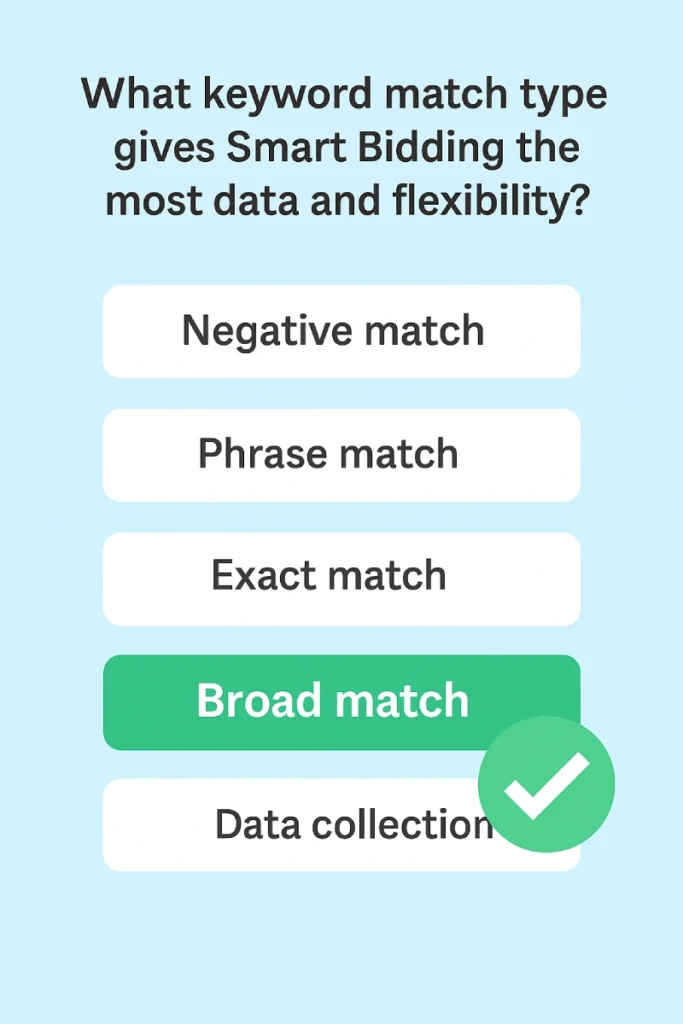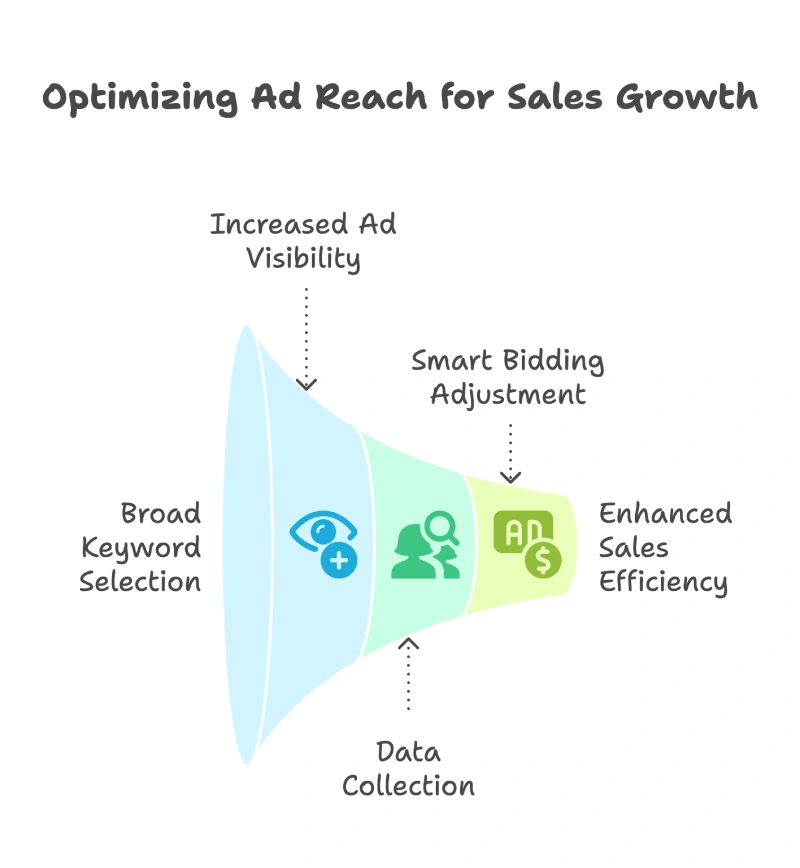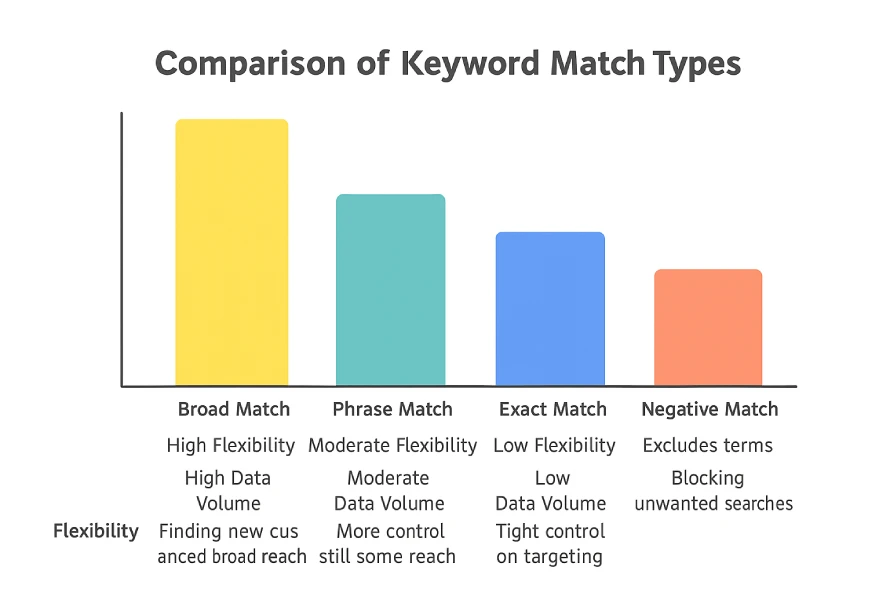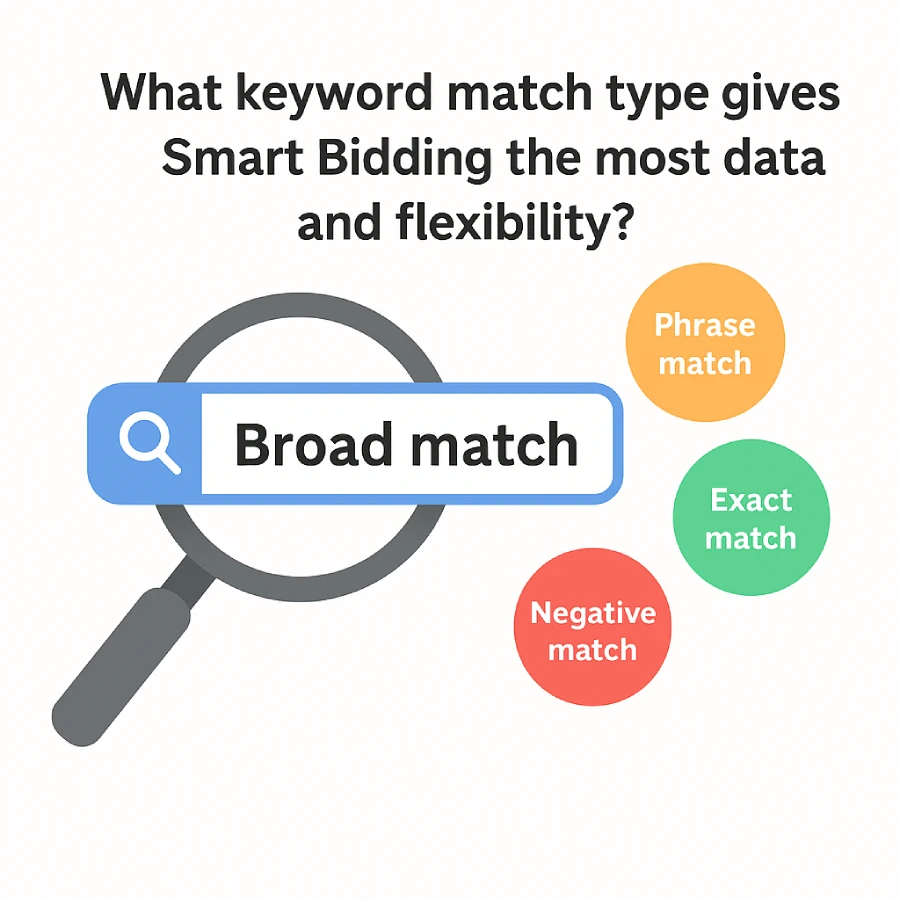I know why you are here. Do you want to take the Google Ads Measurement Certification? But how do you pass the exam? No worries! You are in the right place. In this content, I’ll explore one question from the Google Ads Measurement exam with the right answer. If you want all the questions, then you have to follow the free Google Ads Measurement Certification Study Guide.
If you use Google Ads and Smart Bidding, choosing the right keyword match type is very important. It affects how many searches your ads show up for, how much data Smart Bidding gets, and how well it can optimize your bids.
Now I will explore one question in full detail. So, no delay. Let’s begin.
Table of Contents
Question
What keyword match type gives Smart Bidding the most data and flexibility to compete in the right auctions?
- Negative match
- Phrase match
- Exact match
- Broad match
The Correct Answer
✅ Broad match
It is the keyword match type that gives Smart Bidding the most data and flexibility.

Why broad match is the right choice
Broad match is the default match type in Google Ads, and it lets your ads show for a wide variety of searches related to your keywords, even if the search terms are not exactly the same.
Here’s why broad match helps Smart Bidding the most:
- More Data: Because broad match shows your ads for many related searches, it collects a larger pool of data. This gives Smart Bidding more signals to learn from and make better decisions.
- More Flexibility: Broad match lets Google show your ads in auctions you might miss with tighter match types. Smart Bidding can then adjust bids to compete in the most valuable auctions.
- Discover New Opportunities: Sometimes, broad match finds relevant searches you didn’t think of, helping you reach more customers.
Why the other match types don’t give as much data or flexibility
We already know why we choose broad match. Not all keyword match types give Smart Bidding enough information or freedom to work best. Now we will explain why other options aren’t suitable for Smart Bidding. Here’s why:
Negative Match
Negative match is used to stop your ads from showing on certain searches. It helps avoid unwanted clicks but doesn’t let your ads reach more people. So, it doesn’t give Smart Bidding more data or chances to improve your bids.
Phrase Match
Phrase match shows your ad only if the search includes the exact phrase or close variations in the same order. It is more limited than broad match. Because your ad appears less often, Smart Bidding gets less data and fewer chances to adjust bids.
Exact Match
Exact match is the most strict. Your ad shows only when the search exactly matches your keyword or very close variations. This means fewer people see your ad, so Smart Bidding has very little data and fewer opportunities to find the best bids.
In short, these match types limit how many searches trigger your ads. That means less data and less room for Smart Bidding to do its job well.
Real-life example

Meet Sarah. She owns an online store that sells running shoes. Sarah wants more people to buy her shoes, so she decides to use Google Ads.
Sarah chooses the keyword “running shoes” with broad match. This means her ads show up for many searches like “best shoes for running,” “running sneakers,” or “shoes for jogging.” Because of this, more people see her ads, and Google collects more data about who clicks and buys.
Thanks to this extra data, Google’s Smart Bidding learns which searches are more likely to lead to a sale. It then adjusts bids to show Sarah’s ads to the right people at the right time. This helps Sarah get more sales without spending too much money.
If Sarah used exact match instead, her ads would only appear when someone types “running shoes” exactly. That means fewer people would see her ads, and Google would get less data to help with bidding. So, her sales might not grow as fast.
Comparison
| Match Type | Flexibility | Data Volume | Best For |
|---|---|---|---|
| Broad Match | Highest flexibility | Most data | Finding new customers and broad reach |
| Phrase Match | Moderate flexibility | Moderate data | More control, still some reach |
| Exact Match | Least flexibility | Least data | Tight control on targeting |
| Negative Match | Excludes terms | Limits data | Blocking unwanted searches |

Helpful resource links
Google Ads Help: Keyword Match Types
https://support.google.com/google-ads/answer/7478529
Learn about different keyword match types and how they work in Google Ads.
Google Skillshop: Keyword Match Types Course
https://skillshop.withgoogle.com/googleads/
Free official course by Google to master keyword match types.
Google Ads Help: About Smart Bidding
https://support.google.com/google-ads/answer/7065882
Detailed explanation of Smart Bidding strategies and how they work.
Google Smart Bidding Course
https://support.google.com/google-ads/answer/6167140
Learn all about Smart Bidding directly from Google’s training platform.
Conclusion
Finally, I can say that Broad Match is the best keyword match type to give Smart Bidding the most data and flexibility. It helps Google show your ads to a wider audience and gather more signals to optimize bidding effectively.
Using Broad Match with Smart Bidding, plus negative keywords to filter out unwanted traffic, can improve your campaign performance and help you reach more potential customers.
I hope you understand the question and how to choose the right option. Now, if you are ready, you can take the exam on Skillshop – Google Ads Measurement Certification. If you want more real exam questions and answers like this one, which have already been covered, follow along. I’ll be breaking down more Google Ads Measurement Certification exam questions with full solutions in the next posts on Google Ads!
FAQs
What is broad match in Google Ads?
Broad match lets your ad show for searches that are related to your keywords, even if the exact words are different. This helps your ad reach more people.
Why does broad match give Smart Bidding more data?
Because broad match shows your ads for many types of searches, it collects more information about who clicks and buys. This helps Smart Bidding learn and improve your bids.
What is the difference between phrase match and exact match?
Phrase match shows your ad when the search has your keyword phrase in order, but it can have other words before or after. Exact match only shows your ad when the search matches your keyword exactly or very closely.
Can I use negative keywords with broad match?
Yes! Negative keywords stop your ads from showing on searches you don’t want. This helps you avoid wasting money on bad clicks while still getting broad reach.
Should I always use broad match?
Not always. Broad match works best with Smart Bidding. If you want more control over who sees your ads, you might use phrase or exact match instead.
What happens if I use only exact match keywords?
Your ads will show for fewer searches, so Smart Bidding will have less data to learn from and may not perform as well.
How does Smart Bidding decide how much to bid?
Smart Bidding uses data like the device, location, time, and user behavior to predict how likely someone is to convert and adjusts bids automatically.

